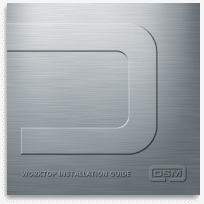When it comes to choosing the perfect worktop for your kitchen, utility room, workshop, or commercial food prep area, the options can be a little overwhelming. Stainless steel, granite, quartz and wood are among the most popular choices in the UK each offering a unique balance of aesthetics, functionality and long-term value.
But how do they actually compare? Which surface performs best under daily wear? Which one is easier to clean, lasts longer, or simply looks the part?
Let’s dig into the key differences to help you decide which worktop material is right for your space.
What Are the Main Worktop Materials?
Before we compare them directly, here’s a quick look at the four main contenders:
- Stainless Steel
- Granite
- Quartz
- Wood
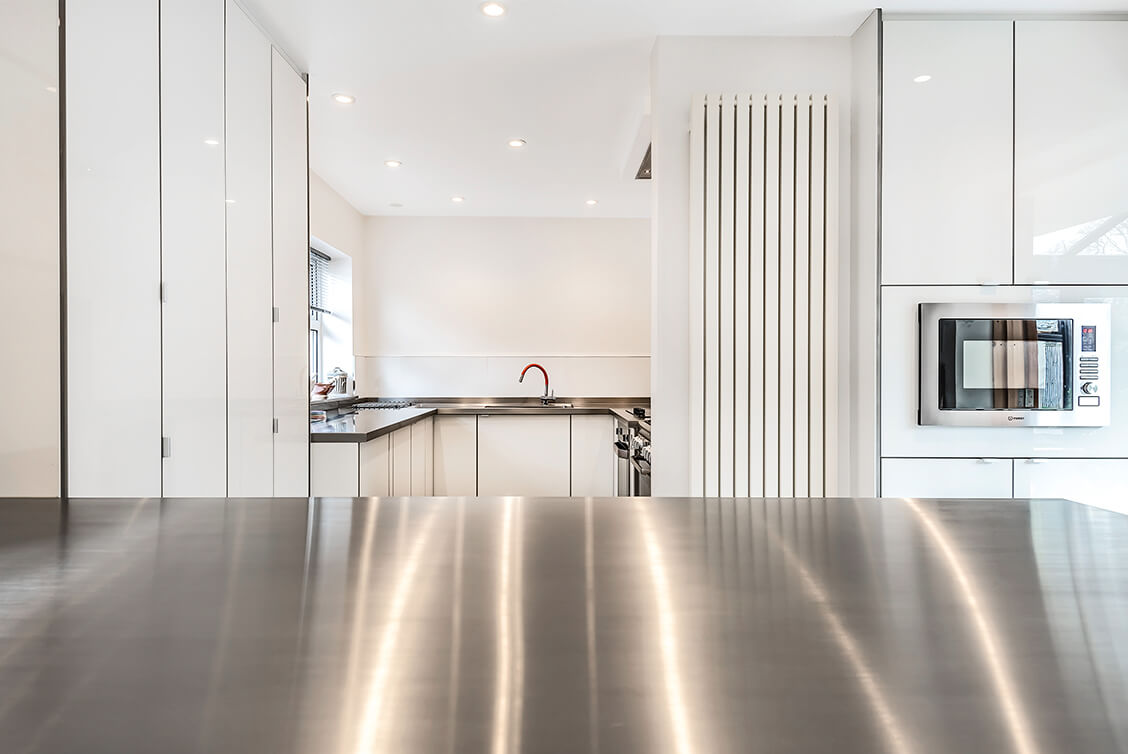
Take a more detailed look at the different materials people usually choose and find out why stainless steel is a top contender.
What are the most common countertop materials?
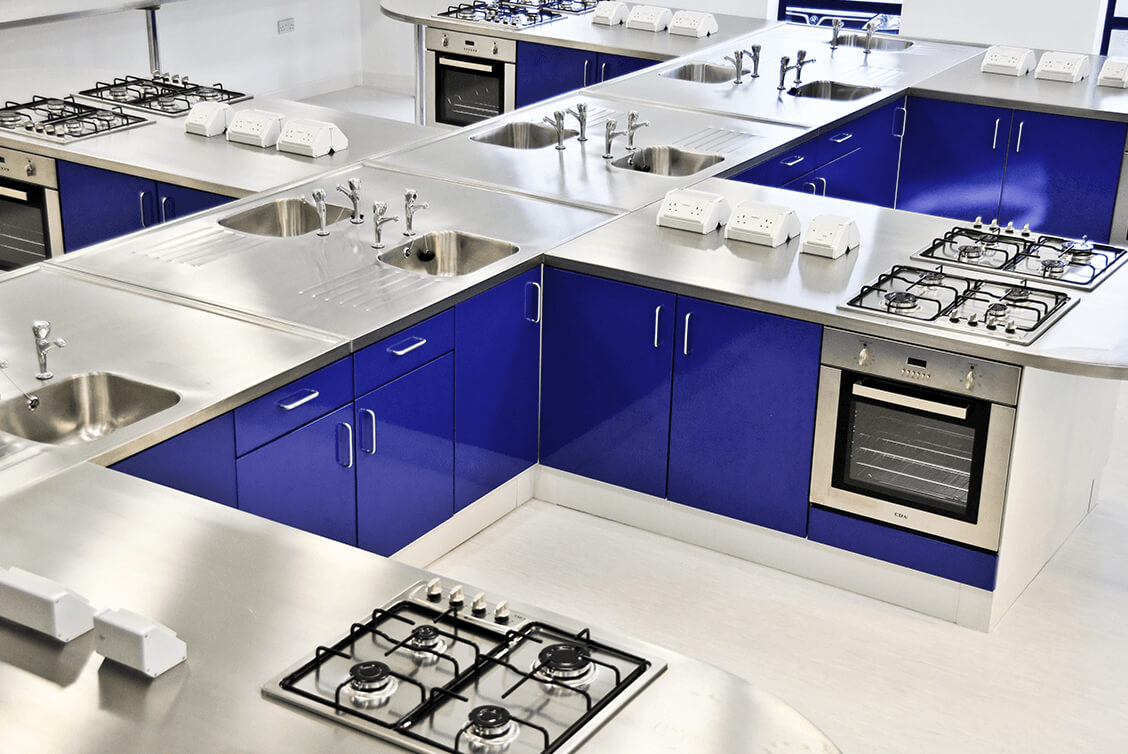
Stainless Steel Worktops
A favourite in commercial kitchens and gaining ground in domestic settings, stainless steel worktops offer a sleek, industrial aesthetic and excellent resistance to heat, bacteria and impact. DSM’s worktops are available in 304 or 316 grade, tailored to each environment.
Ideal for:
- Modern home kitchens
- Commercial food prep areas
- Laboratories
- Workshops
Granite Worktops
Granite is a natural stone known for its elegant patterns and tough, scratch-resistant surface. It’s durable but needs sealing to stay stain-resistant. Every slab is unique, which appeals to homeowners seeking a premium look.
Ideal for:
- High-end kitchens
- Designer homes
Traditional or rustic aesthetics
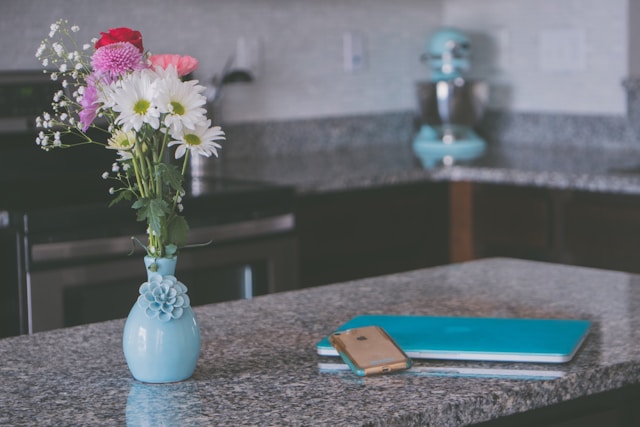
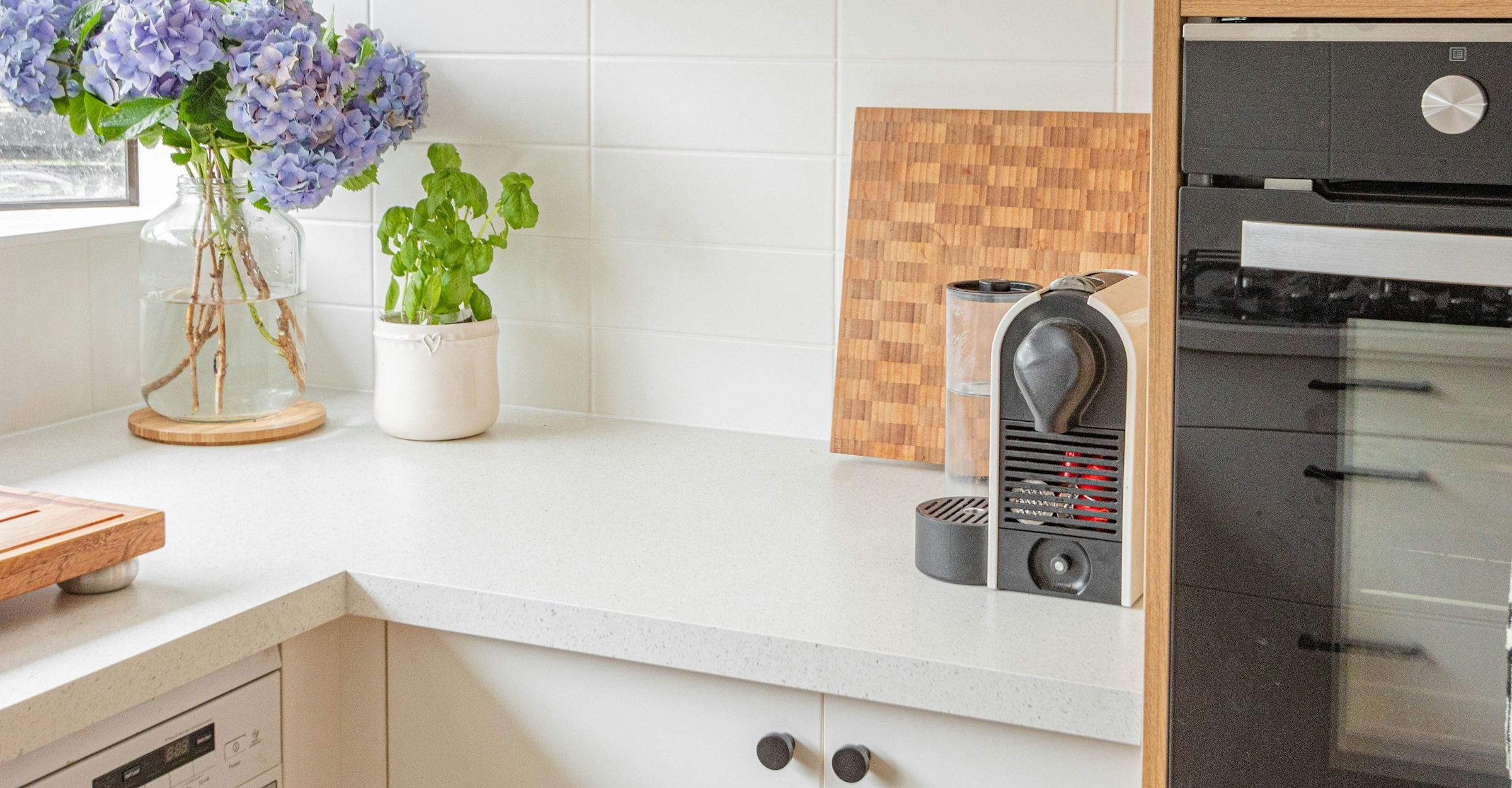
Quartz Worktops
Engineered from crushed quartz stone mixed with resin, quartz offers a uniform, polished appearance and good durability. It’s non-porous, meaning it’s stain-resistant without sealing, but it can’t handle high heat as well as granite or steel.
Ideal for:
- Sleek, modern kitchens
- Households looking for low maintenance
- Busy family homes
Wooden Worktops
Warm and tactile, wood brings a natural softness to any space. It can be sanded and refinished over time, which adds to its appeal. However, it’s porous, prone to staining and scratching, and needs regular oiling to maintain its condition.
Ideal for:
- Cottage-style or farmhouse kitchens
- Scandinavian interiors
- Low-traffic, decorative spaces

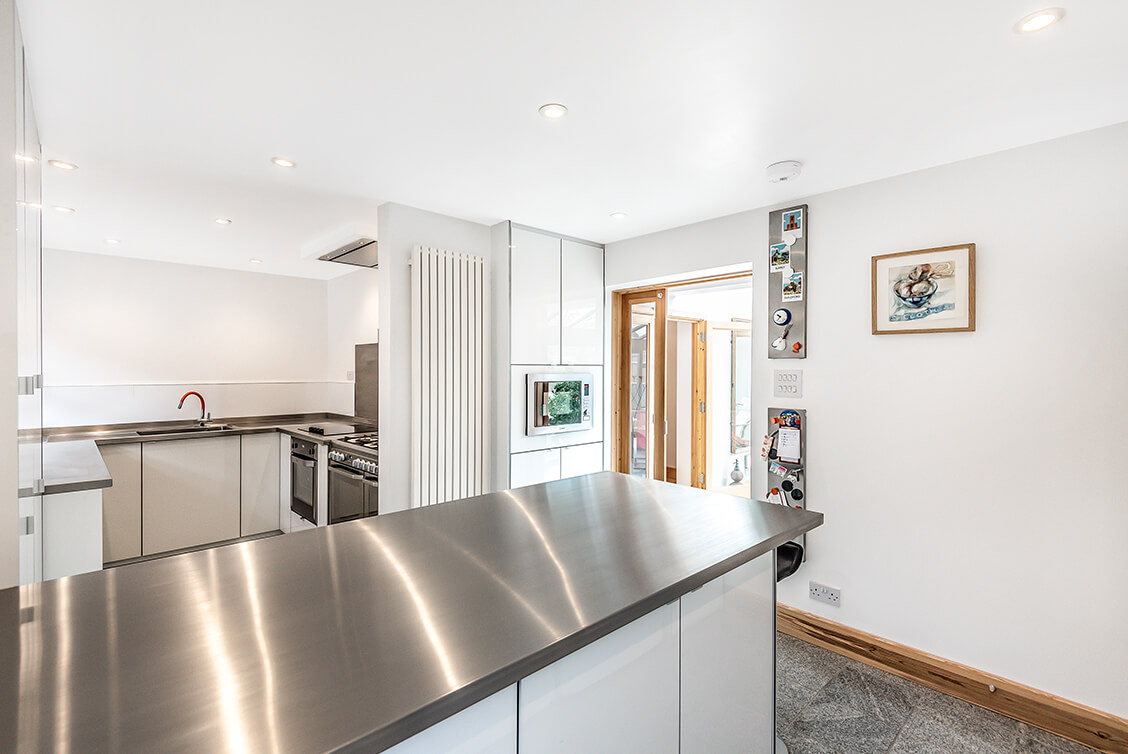
Durability and Resistance
Here’s where things start to separate.
- Stainless Steel is practically bulletproof in kitchen terms. It handles heat, water, knocks, and even chemicals without flinching. Yes, it can scratch but these tend to blend into a patina over time.
- Granite is extremely hard and scratch-resistant, but it can chip if struck hard. It also needs sealing to prevent staining, especially with oil or wine.
- Quartz is tough and resists most scratches, but it can crack or scorch under high heat hot pans are a no-go unless you use trivets.
- Wood is the softest of the group. It can dent and stain easily and is vulnerable to water unless treated carefully. That said, it can be sanded down and refinished multiple times.
Winner: Stainless Steel, for sheer resilience in high-use environments.

Hygiene and Cleanliness
When it comes to keeping things clean, stainless steel stands apart.
Its non-porous surface doesn’t harbour bacteria, and it’s the only material widely approved for clinical and commercial food prep areas. It’s also the easiest to sterilise just wipe it down with antibacterial spray or a hot cloth.
Granite and wood are porous to varying degrees, meaning they can absorb liquids unless treated regularly. Quartz is non-porous, but less resistant to heat than steel.
Hygiene Winner: Stainless Steel, hands down.
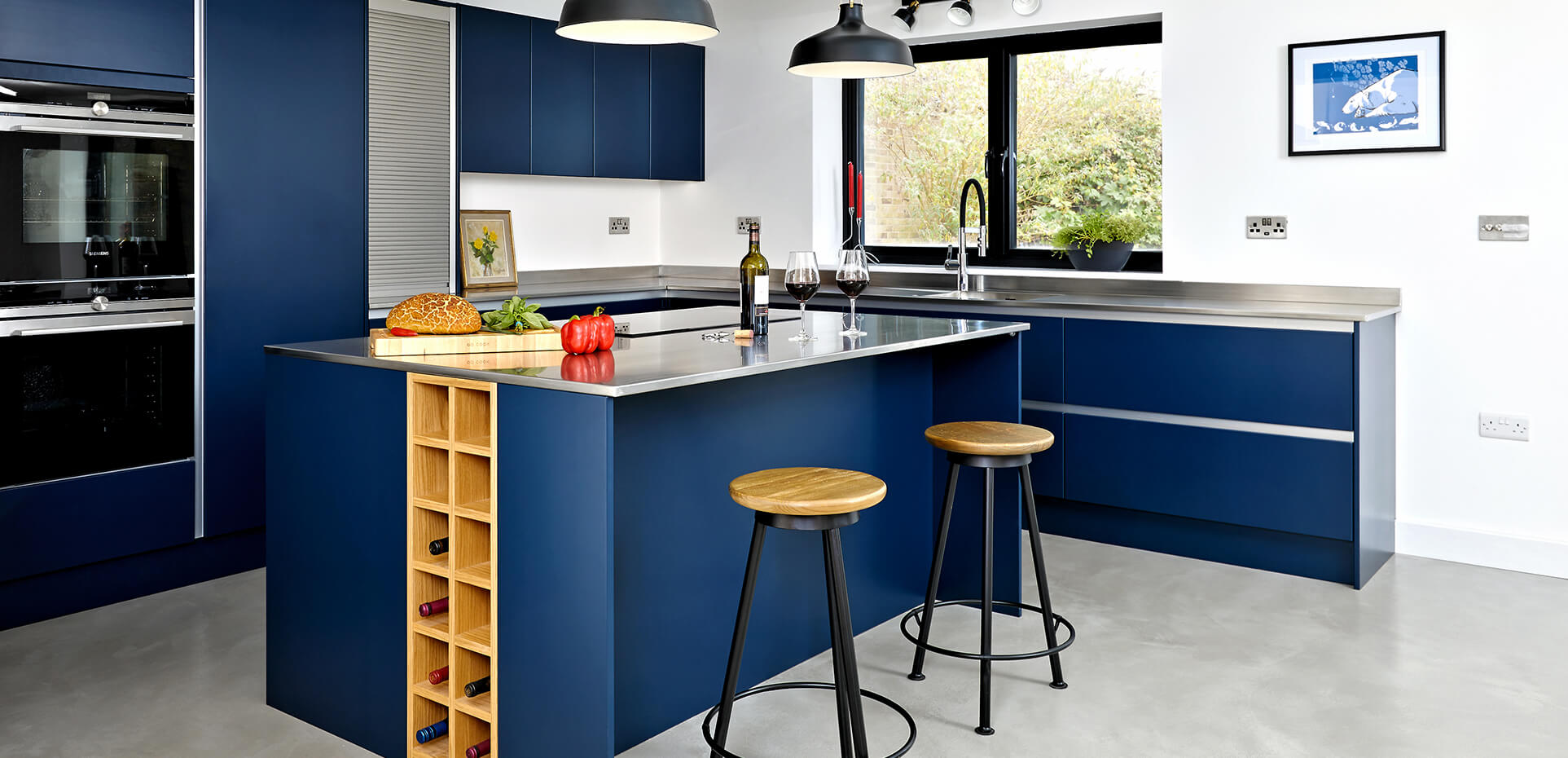
Aesthetics and Design Flexibility
Each material has a distinct look that contributes to the feel and function of a space. Here’s how they compare:
Stainless Steel
Stainless steel gives off a clean, modern vibe — especially when finished in brushed or satin textures. It’s a favourite in minimalist kitchens and pairs seamlessly with materials like glass, stone, and concrete. It reflects light beautifully and brings a sense of professional precision to both home and commercial environments.
Granite
Granite offers rich, natural textures and colours, with no two slabs exactly alike. This uniqueness adds character and a sense of luxury to kitchens and bathrooms. It works particularly well in traditional or rustic settings but can also make a bold statement in more modern interiors when paired with the right cabinetry.
Quartz
Quartz mimics the look of natural stone while providing consistency in colour and pattern. It’s an engineered material that comes in a wide range of colours, from crisp whites to bold contemporary tones. Often selected for its clean, uniform appearance, quartz suits modern, high-design kitchens that benefit from symmetry and cohesion
Wood
Wood brings warmth and softness to any space. It’s tactile and comforting, with grains and tones that evolve over time. Whether you’re aiming for a cottage-style aesthetic or a pared-back Scandinavian vibe, wood softens the harder edges of a kitchen and introduces a sense of natural calm.
In terms of design flexibility, stainless steel stands out. With DSM, you can specify exact dimensions, integrated sinks, welded-in splashbacks, bespoke edge profiles, and even features like fold-down extensions or upstands. Granite and quartz require precise cutting and polishing, limiting some of the design possibilities. Wood, while versatile, demands skilled craftsmanship to achieve seamless joins or integrated features — and even then, it won’t offer the same hygienic or heat-resistant benefits.
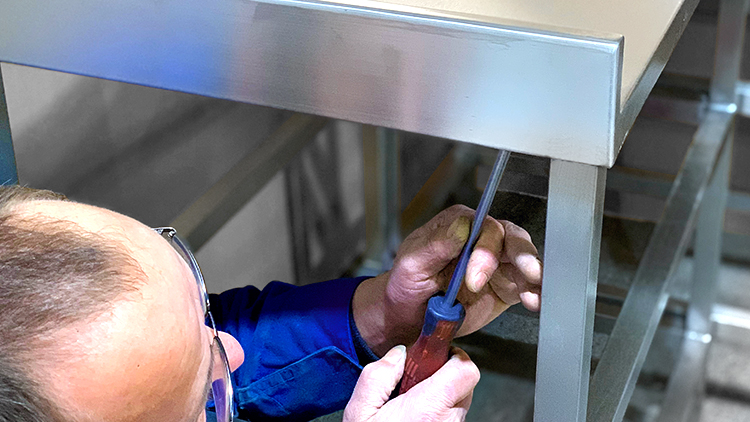
Maintenance and Upkeep
How much work do you want to do? Each material comes with its own level of care and attention:
Stainless Steel
Effortless to maintain. A simple wipe-down keeps it clean, and there’s no need for sealing or oiling. If you like, the occasional polish can restore its original sheen, but it’s entirely optional.
Granite
Requires a bit more attention. Granite needs periodic sealing to protect against stains, and if neglected, it can absorb oils or liquids that are hard to remove.
Quartz
Low-maintenance overall. It resists most stains without sealing, but it’s sensitive to high heat and harsh cleaning chemicals, so care is still needed around hot pans or abrasive products.
Wood
The most demanding of the group. Wooden worktops need regular oiling, are prone to water damage if not maintained, and require gentle handling to avoid scratches or staining.
Low Maintenance Winner: Stainless Steel or Quartz, depending on heat tolerance.

Cost Comparison
Worktop pricing can vary massively depending on material quality, brand, and installation complexity.
- Stainless Steel: Often mid-range to premium, depending on thickness, finish, and customisation. Fully bespoke options still tend to be cheaper than a lot of alternatives and are built to last decades.
- Granite: Generally £400–£800 per linear metre, with exotic types costing more.
- Quartz: Roughly £350–£700 per metre, depending on brand.
- Wood: The cheapest up front (starting from £150–£300 per metre), but may cost more in the long run due to higher maintenance and replacement frequency.
Cost-effectiveness Winner: Stainless Steel, for lifetime value and low maintenance costs.

Environmental Impact
- Stainless Steel: Fully recyclable, long lifespan, minimal maintenance.
Granite/Quartz: Energy-intensive to mine or manufacture. - Wood: Renewable, but short-lived if not maintained.
If sustainability is part of your brief, stainless steel scores high due to its recyclability and longevity.
Which Worktop Should You Choose?
- Go for stainless steel if you need durability, hygiene, custom design and low upkeep. Perfect for chefs, families, or anyone who values performance.
- Choose granite if you want natural beauty and don’t mind the constant upkeep.
- Pick quartz for uniformity and style, as long as you’re cautious with heat and don't mind the price tag.
- Opt for wood if you love character and are happy to maintain it regularly.
Why Choose DSM for Stainless Steel Worktops?
At DSM Stainless Products, we’ve been crafting bespoke stainless steel worktops for over 50 years, supplying everything from domestic kitchens to hospitals and commercial restaurants. We offer:
- Fully custom layouts and dimensions
- Integrated features like sinks and splashbacks
- UK-based manufacturing
- 25-year warranties on all worktops
Whatever your space, we’ll fabricate a surface to fit it perfectly and perform for decades.
Conclusion
Each worktop material has its strengths, but when it comes to hygiene, longevity, customisation and all-round performance, stainless steel remains hard to beat.
Ready to upgrade your space?
Get a free quote today or speak with our team about your project.
FAQs
Do stainless steel worktops scratch easily?
They can scratch, but the marks soften over time into a consistent patina that many people find attractive. You can also use a countertop protector too.
Is granite better than stainless steel?
It depends on your priorities, more of often than not the answer is no. Granite is beautiful and durable but requires sealing and care. Stainless steel offers better hygiene, easier cleaning and full customisation.
Can I mix stainless steel with other worktop materials?
Absolutely. Many modern kitchens combine stainless steel with wood or stone for a contrast of textures and tones.
For more information on cleaning stainless steel, see our Stainless Steel Product Care Brochure
If you're interested in a new kitchen worktop, take a look at our kitchen worktops page for more information.
You can give us a call on 01159 255927 whenever you'd like to ask questions, get advice and even ask for a free, no-obligation quote!
Our Guides & Brochures
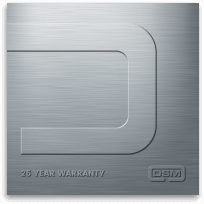
DSM Stainless Steel Product Care
Please take a moment to read our product care brochure to help you look after you new stainless steel units to ensure they look as good as the day they are installed.
Download
DSM 25 Year Warranty
For more information on our 25 year warranty please download our brochure
Download
DSM Terms of Business
Our Terms of Business Agreement sets out the terms and conditions on which we agree to provide services for you
Download